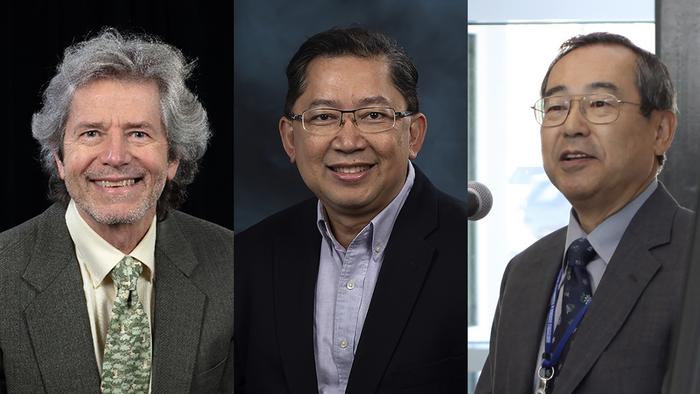Three scientists from the Department of Energy’s Oak Ridge National Laboratory have been elected fellows of the American Association for the Advancement of Science, or AAAS, the world’s largest general scientific society and publisher of the Science family of journals.

Credit: Credit: ORNL, U.S. Dept. of Energy
Three scientists from the Department of Energy’s Oak Ridge National Laboratory have been elected fellows of the American Association for the Advancement of Science, or AAAS, the world’s largest general scientific society and publisher of the Science family of journals.
“Keith Kline, Rigoberto Advincula and Takeshi Egami have delivered significant impact for the scientific community,” said ORNL Director Stephen Streiffer. “This distinguished honor highlights their commitment, hard work and leadership in their respective fields. I offer my congratulations to them on this well-deserved recognition.”
AAAS Fellows are a distinguished cadre of scientists, engineers and innovators who have been recognized for their achievements across disciplines ranging from research, teaching and technology, to administration in academia, industry and government, to excellence in communicating and interpreting science to the public. The AAAS Fellows program is celebrating its 150th anniversary, welcoming 502 scientists and engineers to the 2023 class.
ORNL’s new AAAS fellows include:
Keith Kline, distinguished scientist in the Environmental Sciences Division
Kline was recognized by the AAAS section on Societal Impacts of Science and Engineering “for distinction in promoting evidence-based research and stakeholder engagement to improve natural resource management around the globe.”
Kline is recognized as an international leader applying scientific methods to measure performance toward sustainable development goals, including circular, inclusive and climate-smart economies. His work has focused on community-led natural resource management, which engages stakeholders in setting priorities and developing evidence-based, practical approaches to improve management of water, land and human resources. Kline also spent 24 years on intermittent assignments living and working in developing nations in support of U.S. Agency for International Development programs.
Kline serves as the Just Transitions lead for the multi-agency Net Zero World Initiative, is a perennial co-author of the DOE Billion-Ton Report series focusing on the sustainability of potential U.S. biomass resources, and collaborates with the U.S. Environmental Protection Agency to assess global effects of biofuel policies as coauthor of the Triennial Report to Congress on the U.S. Renewable Fuel Standard. He also leads the Sustainability Workstream for the Clean Energy Ministerial Biofuture Platform, a multi-stakeholder initiative promoting international coordination to advance a sustainable, renewable carbon bioeconomy. His work has supported the DOE Bioenergy Technologies Office and international standard and certification programs to establish practical indicators, targets, baselines and best practices for stakeholder engagement associated with improving the sustainability of biomass production.
Rigoberto Advincula, leader of the Macromolecular Nanomaterials group
Advincula was recognized by the AAAS section on Engineering for his “distinguished contributions in the field of polymer science, particularly in interfacial chemistry, characterization and synthesis of hybrid macromolecular architectures and applications.”
Advincula is a UT-ORNL Governor’s Chair and leads ORNL’s Macromolecular Nanomaterials group in the Center for Nanophase Materials Science. His areas of research include utilizing the structure and functionalities of materials on a near-atomic scale, characterizing and developing new materials sensors, optics, biotechnology, biomedicine, energy production and advanced manufacturing.
Advincula received his doctorate in chemistry from the University of Florida. He did post-doctoral work at Stanford University and the Max Planck Institute for Polymer Research in Germany. He earned his bachelor’s degree in chemistry from the University of the Philippines.
He came to ORNL in 2020 as a joint faculty member at UT and ORNL and was appointed as a Governor’s Chair. Advincula was elected as a Fellow of the Royal Society of Chemistry, the oldest official group devoted to chemistry, the American Chemical Society, the Polymer Science and Engineering Division, the Polymer Chemistry Division, and the National Academy of Inventors.
Takeshi Egami, UT-ORNL distinguished scientist in the Physical Science Directorate
Egami was recognized by the AAAS section on Physics for his “distinguished contributions to condensed matter physics and materials science, particularly for pioneering uses of neutron and synchrotron X-ray scattering techniques to analyze local atomic correlations in complex systems.”
The complex systems that he explores include glasses, liquids, and electronic oxides, such as high-temperature superconductors.
Egami received his bachelor’s degree in applied physics from the University of Tokyo in 1968, and his doctorate in materials science from the University of Pennsylvania in 1971. After the postdoctoral research at the University of Sussex, U.K. and Max-Planck-Institute in Stuttgart, Germany, he returned to the University of Pennsylvania in 1973 as Assistant Professor. He was promoted to Associate Professor in 1976, to Professor in 1980, and was the Chair of the Department of Materials Science and Engineering from 1997 to 2002. He moved to the current position in 2003. He was the director of University of Tennessee-ORNL Joint Institute for Neutron Sciences from 2008-2015.
AAAS is the world’s largest general scientific society and publisher of the journal Science, as well as Science Translational Medicine; Science Signaling; a digital, open-access journal, Science Advances; Science Immunology; and Science Robotics. AAAS was founded in 1848 and includes more than 250 affiliated societies and academies of science.
UT-Battelle manages ORNL for the Department of Energy’s Office of Science, the single largest supporter of basic research in the physical sciences in the United States. The Office of Science is working to address some of the most pressing challenges of our time. For more information, please visit energy.gov/science.
Discover more from Science
Subscribe to get the latest posts sent to your email.


